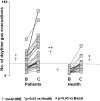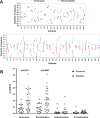Anal gas evacuation and colonic microbiota in patients with flatulence: effect of diet
- PMID: 23766444
- PMCID: PMC3933177
- DOI: 10.1136/gutjnl-2012-303013
Anal gas evacuation and colonic microbiota in patients with flatulence: effect of diet
Abstract
Objective: To characterise the influence of diet on abdominal symptoms, anal gas evacuation, intestinal gas distribution and colonic microbiota in patients complaining of flatulence.
Design: Patients complaining of flatulence (n=30) and healthy subjects (n=20) were instructed to follow their usual diet for 3 days (basal phase) and to consume a high-flatulogenic diet for another 3 days (challenge phase).
Results: During basal phase, patients recorded more abdominal symptoms than healthy subjects in daily questionnaires (5.8±0.3 vs 0.4±0.2 mean discomfort/pain score, respectively; p=<0.0001) and more gas evacuations by an event marker (21.9±2.8 vs 7.4±1.0 daytime evacuations, respectively; p=0.0001), without differences in the volume of gas evacuated after a standard meal (262±22 and 265±25 mL, respectively). On flatulogenic diet, both groups recorded more abdominal symptoms (7.9±0.3 and 2.8±0.4 discomfort/pain, respectively), number of gas evacuations (44.4±5.3 and 21.7±2.9 daytime evacuations, respectively) and had more gas production (656±52 and 673±78 mL, respectively; p<0.05 vs basal diet for all). When challenged with flatulogenic diet, patients' microbiota developed instability in composition, exhibiting variations in the main phyla and reduction of microbial diversity, whereas healthy subjects' microbiota were stable. Taxa from Bacteroides fragilis or Bilophila wadsworthia correlated with number of gas evacuations or volume of gas evacuated, respectively.
Conclusions: Patients complaining of flatulence have a poor tolerance of intestinal gas, which is associated with instability of the microbial ecosystem.
Keywords: Colonic Bacteria; Colonic Fermentation; Colonic Microflora; Functional Bowel Disorder; Visceral Sensitivity.
Figures




References
-
- Azpiroz F, Levitt M. Intestinal gas. In: Feldman M, Friedman LS, Brand LJ. eds. Sleisebger and Fordtran's. Gastrointestinal and liver disease: pathophysiology, diagnosis, management. Canada: Saunders, Elsevier, 2010:233–40
-
- Azpiroz F, Malagelada J-R. Abdominal bloating. Gastroenterology 2005;129:1060–78 - PubMed
-
- Anderson IH, Levine AS, Levitt MD. Incomplete absorption of the carbohydrate in all-purpose wheat flour. N Engl J Med 1981;304:891–2 - PubMed
-
- Levitt MD, Hirsh P, Fetzer CA, et al. H2 excretion after ingestion of complex carbohydrates. Gastroenterology 1987;92:383–9 - PubMed
-
- Flourie B, Leblond A, Florent C, et al. Starch malabsorption and breath gas excretion in healthy humans consuming low- and high-starch diets. Gastroenterology 1988;95:356–63 - PubMed
Publication types
MeSH terms
Substances
LinkOut - more resources
Full Text Sources
Other Literature Sources
Medical
